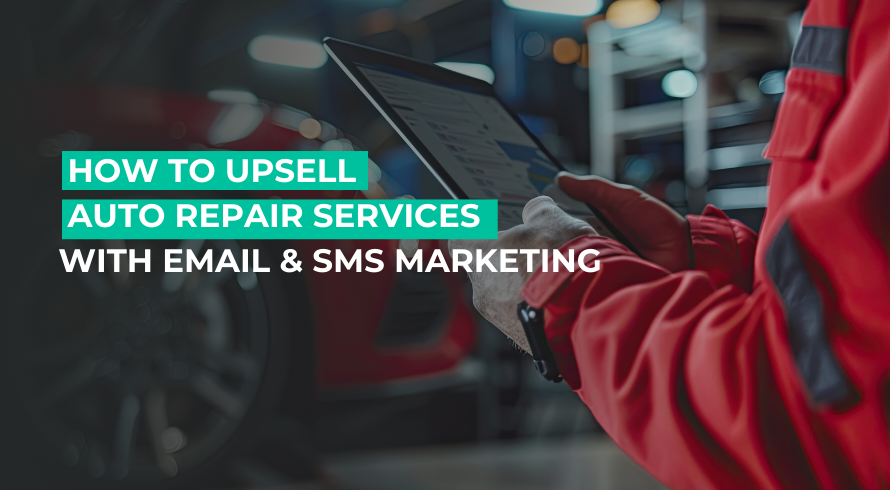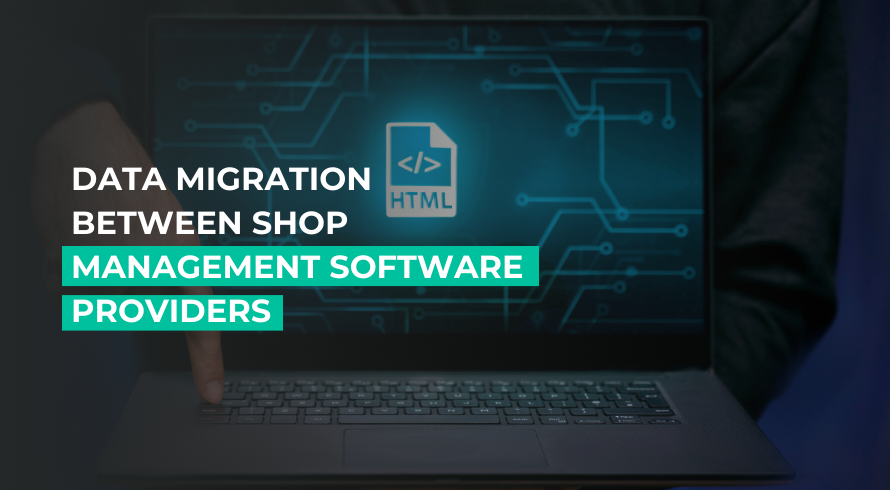Introduced in the mid-1990s, On-Board Diagnostics II (OBD2) scanners are revolutionary tools in the modern automotive industry. They connect with your vehicle’s onboard computer system. This provides mechanics with real-time data and diagnostic information.
Now, OBD2 scanners have changed the way mechanics and auto repair shops diagnose and fix vehicle issues. These can be connected to the OBD2 port located under the dashboard. The scanners can then read and clear error codes, monitor vehicle performance, and even predict potential failures before they become critical.
Importance of OBD2 scanners for auto repair shops
For auto repair shops, OBD2 scanners are not just convenient. They help to:
- Streamline the diagnostic process, allowing technicians to quickly identify problems and provide accurate repairs. This saves time.
- Provide detailed information that helps mechanics make informed decisions, ensuring that repairs are done correctly the first time.
As a result, shops can avoid costly comebacks, reduce vehicle downtime, and maintain a high service quality.
In today’s competitive market, having reliable OBD2 scanners can set an auto repair shop apart. This makes them an investment for any auto repair business aiming to offer top-tier automotive services.
Schedule a free demo today!

Boost your shop sales

Simplify shop management

Empower your technicians
Types of OBD2 scanners
Basic code readers: simplicity and affordability
Basic code readers are the most straightforward type of OBD2 scanners. These are designed for simplicity and ease of use. And these are perfect for mechanics who want to quickly check and clear diagnostic trouble codes (DTCs). This does not even require any extensive technical knowledge.
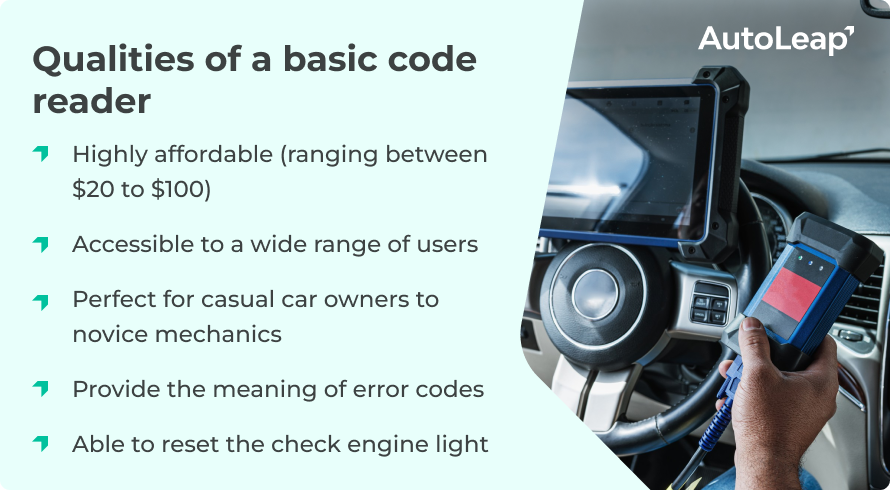
These are great for understanding basic vehicle issues and deciding whether further repair services are necessary. You can keep these in your auto shop for basic diagnosis and to understand the required level of services.
DIY scanners: More features for the home mechanic
For the more hands-on car enthusiast or the home mechanic, DIY scanners offer more set of features than basic code readers. These devices read and clear DTCs. They also provide access to live data streams. This allows users to monitor various sensors and system performances in real-time.
DIY scanners often come with a few additional functionalities. These are still affordable (between $80-$150), but they are slightly more expensive than basic code readers. This is because of their enhanced capabilities and broader range of applications.
Professional scanners: Advanced diagnostics for auto repair shops
Now comes the professional OBD2 scanners. These provide advanced diagnostics and are a great investment for your auto repair shop. These are designed to meet the demanding needs of auto repair shops and professional mechanics. These scanners offer comprehensive diagnostic capabilities, such as:
- Access to manufacturer-specific codes
- Advanced data logging
- Bidirectional controls
These allow technicians to interact with various vehicle systems and components directly.
Professional OBD2 scanners can perform a wide array of diagnostic and repair tasks. They can reset service lights and also calibrate sensors to program new keys and modules.
They are more expensive than the basic code readers and DIY scanners. They can go over $400. This is because of their ability to diagnose complex issues accurately and efficiently. This helps your technician perform quicker repairs. Which ultimately leads to higher customer satisfaction. For any auto repair shop aiming to deliver top-notch service, a professional OBD2 scanner is a great tool to have onboard.
Essential features of a quality OBD2 Scanner
Compatibility: Universal scanners and manufacturer-specific options
This is the most important feature. Your OBD2 scanner needs to be compatible with a wide range of vehicles. Universal scanners are designed to work with any vehicle that supports the OBD2 standard. This makes them versatile and convenient for general use.
Manufacturer-specific scanners
Some scanners are made for specific manufacturers. These have deeper integrations and access to manufacturer-specific codes and features. So, if your auto repair shop frequently services vehicles from certain brands, it makes sense for you to purchase a manufacturer-specific option.
Functionality: Code reading, live data, and beyond
Your auto shop OBD2 scanner needs to offer more than just basic code reading and clearing.
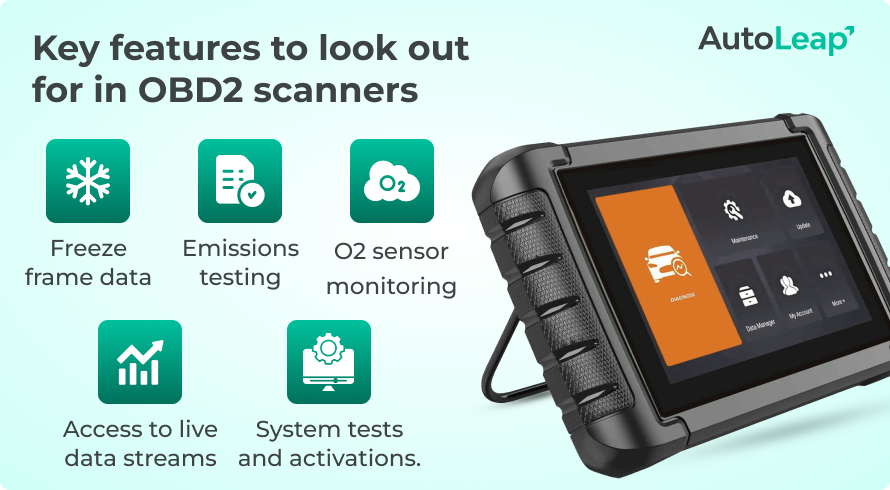
The more functionalities a scanner offers, the more versatile and valuable it becomes. This allows mechanics to diagnose and address a wider range of issues effectively, which is a great asset for your auto shop.
Display and user interface: Ease of use and clarity
The display and user interface of an OBD2 scanner affect its ease of use. A quality scanner should have:
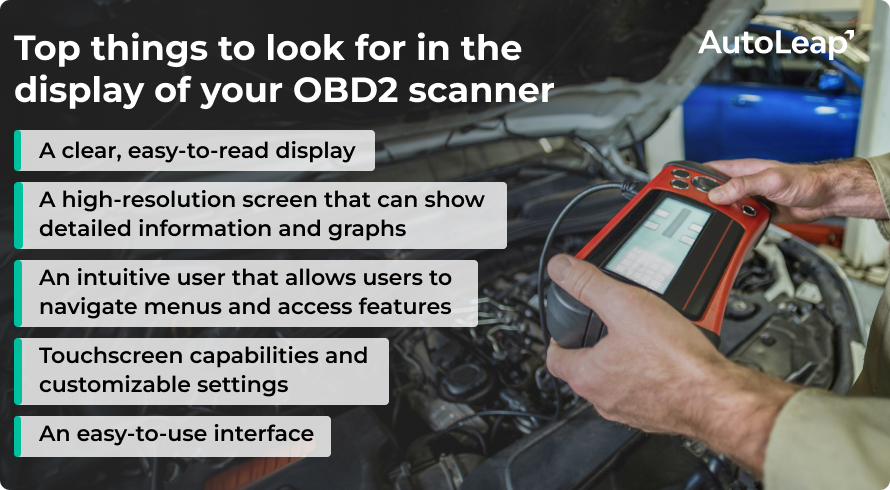
Software updates and support: Keeping your scanner relevant
Vehicle technology is always evolving. And when it is advancing, your OBD2 scanner also needs to go through regular software updates. This will help it keep up with the latest advancements and new vehicle models.
This helps the scanner remain relevant and capable of diagnosing any new cars on the market. Here, you also need to look out for good customer support from the manufacturer. If they are assisting with troubleshooting, that can help you speed things along.
Price and value: balancing cost and capabilities
Your OBD2 scanner needs to have a good balance between the cost and features:
- Basic code readers are affordable and sufficient for simple diagnostics
- More advanced and professional scanners with extensive functionalities come at a higher price.
Assess your auto shops specific needs. Make a note of the type of vehicles you service to make your decision.
At times, high-quality, feature-heavy scanners can save money in the long run. So you need to evaluate what works for you in terms of the value and benefits being provided.
Top 8 OBD2 scanners for 2024
Best overall OBD-2 scanner
TOPDON ArtiDiag 800BT
Looking for an OBD-2 scanner with a great range of features with wireless connectivity? Go for TOPDON ArtiDiag 800BT. This diagnostic scanner has an internal battery. With a donge that has a 30-foot range, it can also be easily connected so you can walk around the vehicle as you make your inspections.
It costs over $400 but is compatible with 96 vehicle manufacturers. If you need advanced diagnostic powers, then this is the best scanner. It also has ABS and SRS diagnostic capabilities. We believe this could be a great addition to your auto shop if you work with cars from many manufacturers.
According to our research, this scanner also wins the title for the Best OBD-2 Scanner for Easy Use. Its been designed for easy use and effortless handling. Customers on Amazon also vouch for the same. The key features that make it easy to use:
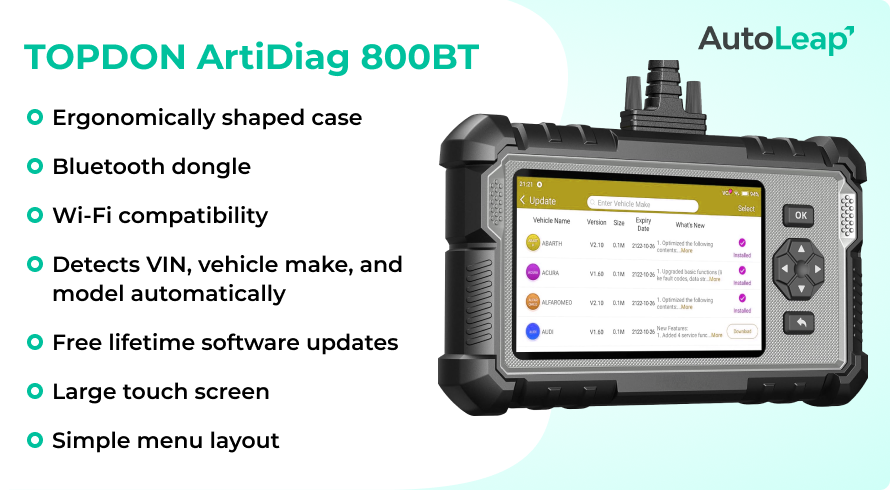
We feel it can easily be used by anyone without advanced knowledge of vehicle maintenance tools. While being so easy to use, it is also named a ‘professional-level scan tool’ by users. Customer were also appreciative of the wireless connectivity, quality and performance of this scanner.
Complaints, however, says that its battery drains fast, while some have complained about advanced features not working. However, overall this OBD-2 scanner ranks high and is worth the investment.
Autel AL539
Forbes named Autel AL 539 as the best OBD-2 scanner.
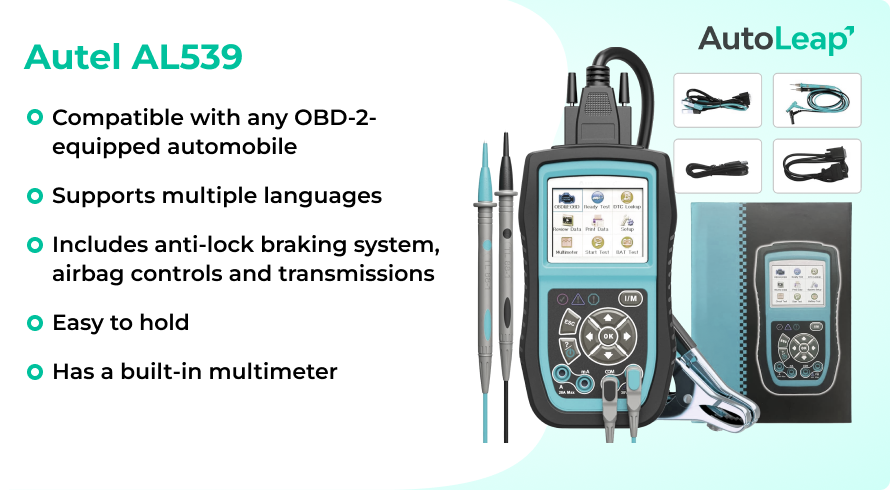
From our experience we’ve seen, you can do more with this than just check engine functions. You can also use it to diagnose vehicle batteries, charging systems, and electrical faults. Autel AL 539 is priced at around $90. Customers say it is highly convenient and offers good value for money. We feel this is a great addition to your auto shop if you want a good OBD2 scanner that is easy on the pocket too.
There were a few complaints where users received defective units, failure in firmware updates and underwhelming customer service. Some customers on Amazon also reported issues with accuracy, data and range. However, the positive reviews outweigh the negatives.
Best budget OBD-2 scanner
Foxwell NT201
Foxwell NT201 is the best OBD-2 scanner if you’re on a budget for your auto shop. It costs around $50, and it helps you with DTC look up and emissions testing.
From our experience, we have noticed it lacks many of the advanced features of the TOPDON ArtiDiag 800BT.
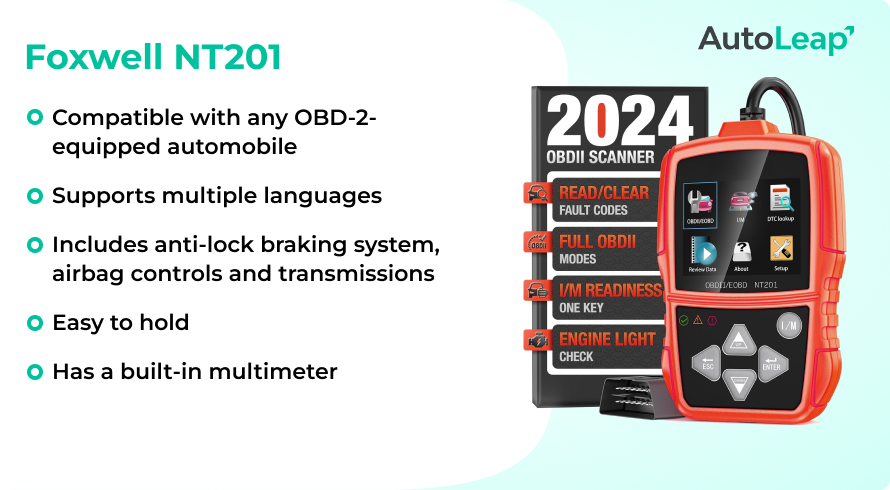
We love how it is easy to use and extremely lightweight. This makes it less durable. However, customers say it works on the more popular car models. It is not compatible with lesser-known vehicles. Anyone who owns a foreign, discontinued, or luxury car model has faced compatibility issues with this scanner. Users on Amazon also reported issues with readability. But overall they considered Foxwell NT201 a good investment.
Innova CarScan Advisor 5210
Although an affordable and basic scanner, Innova CarScan Advisor has more features than just clearing codes. What we appreciate about this car scanner is that it can also present freeze-frame data, like Foxwell NT201. When a fault code is triggered, the freeze-frame data setting displays vehicle information for the auto mechanic.
Apart from helping you clear the check engine light and running battery and charging system tests, you can also check anti-lock braking systems (ABS) with Innova. It costs around $100 but can work with Asian and European cars with 1996 models and after. So, we think if your auto shop primarily works with Asian and European cars, then this is a good investment.
However, it lacks functionality and has a very short cable. It also does not include hybrid battery testing. Some users have complained about poor Bluetooth connectivity and problems with some of the advanced features. It is easy to use. But before purchasing, ensure it is compatible with the cars you need to work on.
Ancel Model BD310
Ancel BD310 is another budget-friendly scanner. It will read and clear check engine codes. It even comes with Bluetooth connectivity and can easily be paired with your smartphone or tablet via the app. However, some customers say they faced issues with Bluetooth connectivity.
It costs around $80. Customers appreciate the quality of the Ancel BD310 scanner. They say it is very well constructed, provides an incredible amount of information, and is very easy to use. We feel iff you want a scanner to just read and clear codes, you can consider this for your auto shop.
Best bluetooth scanner
BlueDriver Bluetooth Pro OBD2 Scan Tool
This BlueDriver Bluetooth Pro is paired with a free mobile app that gets routine software updates. It works with Android smartphones and Apple iPhones both.
Your auto shop technician can connect with their phone app via Bluetooth and view the live data reports. They can also perform a smog test and get repair recommendations for specific codes.
For $120, you get an easy-to-use OBD-2 scanner, with an app that has a simple interface. We saw that this also allows you to set up customizable monitoring of basic information such as engine RPMs and exhaust pressure.
Customers on Amazon like the information provided by BlueDriver Bluetooth Pro. They go as far as to say it is invaluable for diagnostic purposes. They also appreciate its ability to clear codes and its performance.
Best professional grade OBD-2 scanner
Autel MaxiCom MK808
Now, if you need a professional-grade OBD-2 scanner, then we think the Autel MaxiCom MK808 is the one for you. It is:
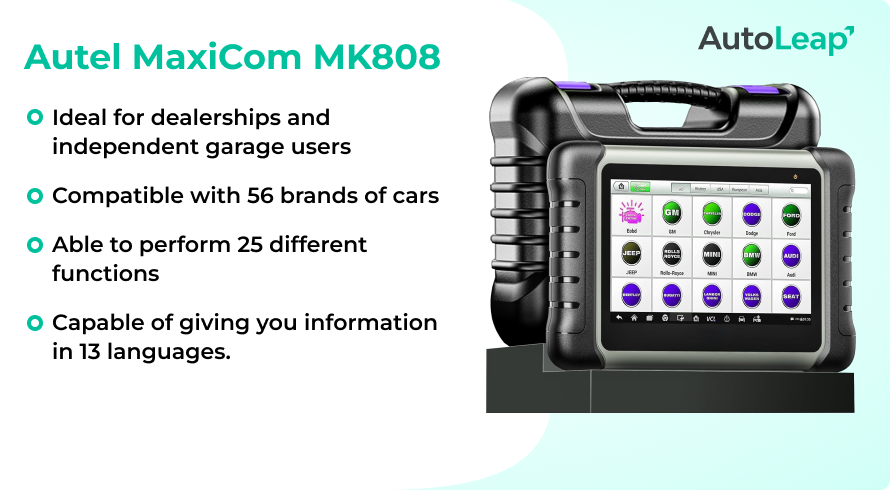
With all its features, it comes at $479. The first-year update is free, but after that, you have to pay for each yearly upgrade. It also comes with a rugged 7-inch tablet-style layout.
The professional OBD-2 scanner has the most features. From advanced scanning to business-friendly applications, and a 7-hour battery life, it is the best choice for professional users and auto repair shops. It can connect to Wi-Fi, but you must set up an Autel account. This will give you access to additional scanner features.
For any professional mechanics, running their auto shop, we believe this is probably the best pick (if your budget aligns). Customers appreciate the intuitive interface of Autel MaxiCom MK808. It is a great product for the money. Only a few reported problems with battery life.
Best handheld scanner
Foxwell NT301
Where Foxwell NT201 is one of the best budget-friendly scanners, our experience tells us that Foxwell NT301 is the best handheld scanner. At around $70, it is a great battery tester and has cables with alligator clamps. A 2.8-inch color screen displays the trouble code data for you.
It has color-coded fault lights and large control buttons, however it comes with a short cable. If you need a handheld scanner, then you can buy this for your auto shop.
The user manual is also confusing, and there have been issues with software updates. Users on Amazon complain about the ease of updating and code reading. However, they do appreciate the ease of use, features, and value for money the Foxwell NT301 scanner gives.
OBD2 scanner accessories and add-ons
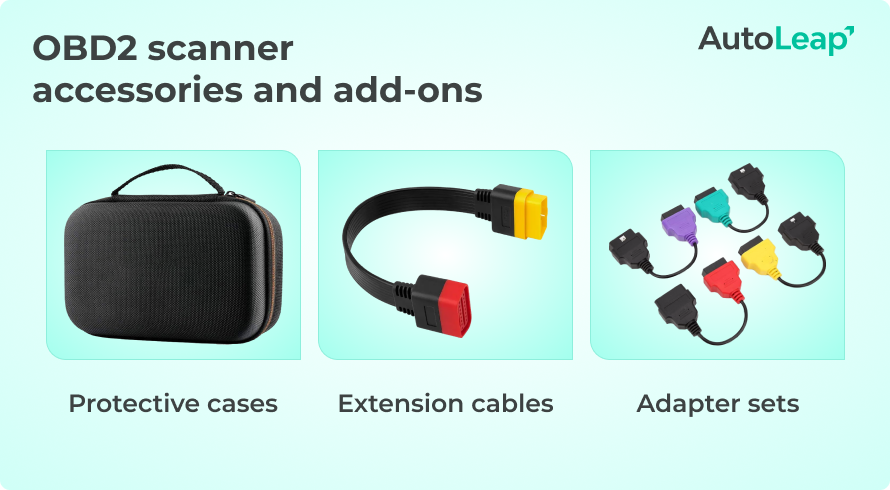
Protective cases: Safeguarding your investment
Protective cases safeguard your scanner against physical damage such as drops, bumps, and scratches. These cases are made with durable materials. And they can easily withstand the rigorous environment of a busy auto repair shop.
Some cases also offer compartments for storing cables, adapters, and other accessories. This keeps it all organized and easily accessible. By protecting your scanner, you can avoid costly repairs or replacements. This will help keep it in top working condition.
Extension cables: Added convenience for hard-to-reach ports
Extension cables for OBD2 scanners provide added convenience when accessing hard-to-reach OBD2 ports. In some vehicles, the diagnostic port may be located in a difficult or awkward position. So, the OBD2 scanner cannot be connected directly.
Extension cables extend the reach of your scanner. You can easily plug in and use the device without getting uncomfortable.
Adapter sets: Connecting to a wide range of vehicles and protocols
Adapter sets help connect your OBD2 scanner to various vehicles and diagnostic protocols. While most modern vehicles use the standard OBD2 port, older models and certain manufacturers may use different connectors.
An adapter set allows you to interface with various vehicle makes and models, expanding the versatility of your scanner. An adapter set helps your OBD2 scanner handle various diagnostic tasks. This makes it a valuable tool for any auto repair shop.
How to choose the right OBD2 scanner for your needs
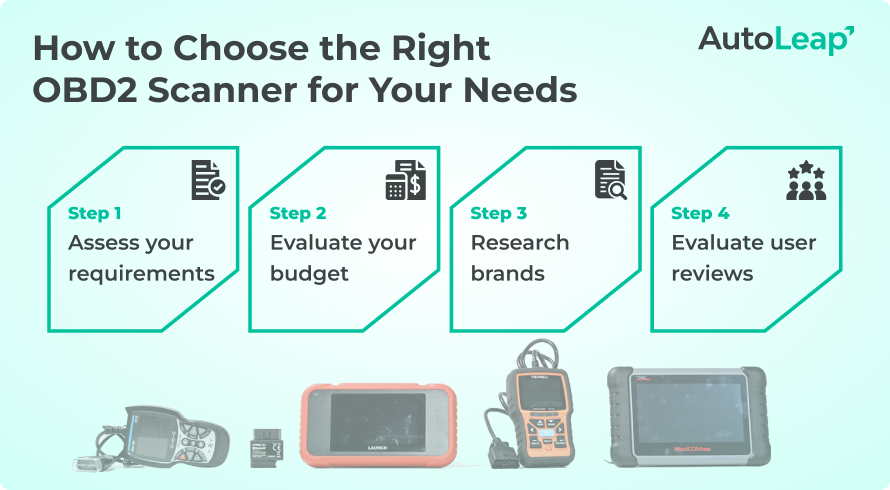
Assess your requirements: Personal vs. professional use
The first step in choosing the right OBD2 scanner is to assess your specific requirements. Are you a casual car owner looking to perform basic diagnostics on your vehicle? Or are you a professional mechanic in need of advanced diagnostic capabilities?
For personal use, a basic code reader or DIY scanner with essential features like code reading and live data will do.
On the other hand, professional mechanics and auto repair shops will benefit from investing in a professional-grade scanner. They can make use of advanced functionalities such as diagnostics, bi-directional controls, and compatibility with a wide range of vehicles.
Evaluate your budget: Finding the right balance of features and cost
It might be tempting to go for the most feature-rich and expensive model. But you need to find a balance between cost and functionality.
- Basic code readers are the most affordable option and are suitable for simple diagnostics
- DIY scanners offer more features at a slightly higher price point, providing better value for home mechanics
- While more expensive, professional scanners offer extensive capabilities essential for professional use.
Prioritize the features that are most important for your diagnostic needs. And then invest accordingly.
Research brands and customer reviews: Learning from others’ experiences
Never purchase anything, not even an OBD2 scanner, without researching different brands. You should always read customer reviews to know what others think about the product you want to buy.
Well-known brands might offer reliable and durable products. They might even have good customer support and regular software updates. But that you will know after sufficient research. Customer reviews also provide valuable insights into the performance and usability of various scanners. They highlight both strengths and weaknesses. When reading customer reviews, look to ensure they are:
- From users with similar needs to yours to get a better understanding of how the scanner performs in real-world scenarios
- Covering scanner’s compatibility with different vehicle makes and models, as well as its ease of use and overall value for money.
By learning from others’ experiences, you can make a more informed decision and choose the right OBD2 scanner for your needs.
OBD2 scanner operation: A step-by-step guide
Locating the OBD2 port in your vehicle
The OBD2 port is typically found within the driver’s side footwell, under the dashboard. It may also be positioned near the steering column, center console, or above the pedals. Consult your vehicle’s owner’s manual for the exact location.
Connecting the scanner and establishing communication
After locating the OBD2 port, turn off your vehicle to prevent electrical issues. Plug the scanner into the port until it clicks. Switch the ignition to the “On” position without starting the engine to power the scanner. Follow the scanner’s instructions to establish communication and select the “scan” or “diagnose” option from the menu.
Scanning for codes and interpreting the results
Once the scanner communicates with the vehicle, select the option to read codes from the menu. The scanner will display any diagnostic trouble codes (DTCs), typically a combination of letters and numbers. Use the scanner’s manual or an online database to interpret the codes. This indicates potential issues with specific vehicle systems.
Clearing codes and resetting the check engine light
After addressing any issues indicated by the DTCs, select the clear/reset option on the scanner to erase the codes. Confirm your selection, turn off the ignition, and disconnect the scanner. Start the engine to ensure the check engine light has been reset.
Understanding OBD2 codes: A quick overview of diagnostic categories
You will see the diagnostic trouble code (DTC) as an alphanumeric string. If your scanner does not explain the issue to you (most advanced scanners might do that for you), you can look it up online.
The letter in a DTC will be P,B,C or U. The letters will tell you which part of your vehicle has a problem.
Powertrain codes (P)
Powertrain codes, marked by “P,” highlight issues like engine misfires and fuel system problems. This information is needed for vehicle performance.
Body codes (B): Monitoring vehicle body systems
Body codes designated “B” address systems like airbags and climate control. This is required for vehicle safety and comfort.
Chassis codes (C): Keeping tabs on chassis components
Chassis codes, labeled “C,” diagnose suspension, brakes, and steering issues. This helps with vehicle handling and stability.
Network communication codes (U): Assessing onboard communication networks
Network communication codes, indicated by “U,” detect problems in the vehicle’s communication systems. This is needed for the proper interaction of electronic modules.
Common OBD2 Scanning Problems and Troubleshooting
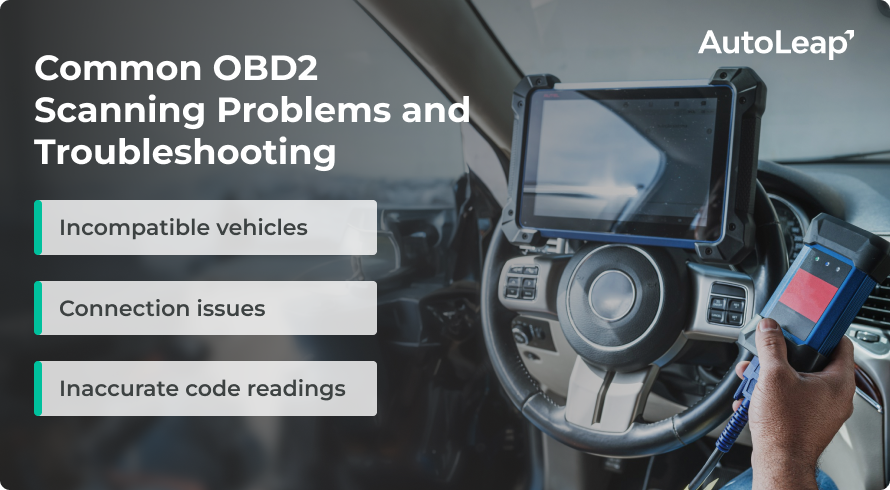
Incompatible vehicle: Verifying vehicle compatibility
One common issue when using an OBD2 scanner is an incompatible vehicle. Not all scanners are universal. Some may not work with certain makes, models, or years of vehicles. To avoid this problem, always check the scanner’s compatibility with the specific vehicle before using it. You can also consult the scanner’s manual or the manufacturer’s website to ensure it supports the vehicle’s OBD2 protocol.
Connection issues: Ensuring secure and reliable connections
Connection issues may arise from a loose connection between the scanner and the OBD2 port, faulty cable, or even vehicle port issues. To troubleshoot connection problems:
- Ensure the scanner is securely plugged into the OBD2 port.
- Inspect the cable for any damage or wear.
- Clean the OBD2 port to remove any dirt or debris.
If problems persist, trying the scanner on a different vehicle can help determine whether the issue lies with the scanner or the vehicle.
Inaccurate code readings: Identifying causes and solutions
Inaccurate code readings can occur due to several factors, such as outdated scanner software, electrical interference, or faults in the vehicle’s computer system. To address these issues:
- Regularly update the scanner’s software to ensure it can accurately read and interpret the latest codes.
- Avoid using the scanner in areas with high electrical interference.
- Perform a thorough check of the vehicle’s electrical system to identify any underlying issues that might affect the accuracy of code readings.
Wrapping Up
OBD2 scanners are invaluable tools in the automotive industry. They enable your auto shop mechanics to access real-time data and diagnostic information from a vehicle’s onboard computer system.
Investing in the right OBD2 scanner enhances diagnostic efficiency. They can save time for your auto technicians, allowing them to diagnose problems faster. This results in improved customer satisfaction and service quality in auto shops. We hope our guide on the best OBD2 scanners for 2024 helps you buy the right one for your auto shop.

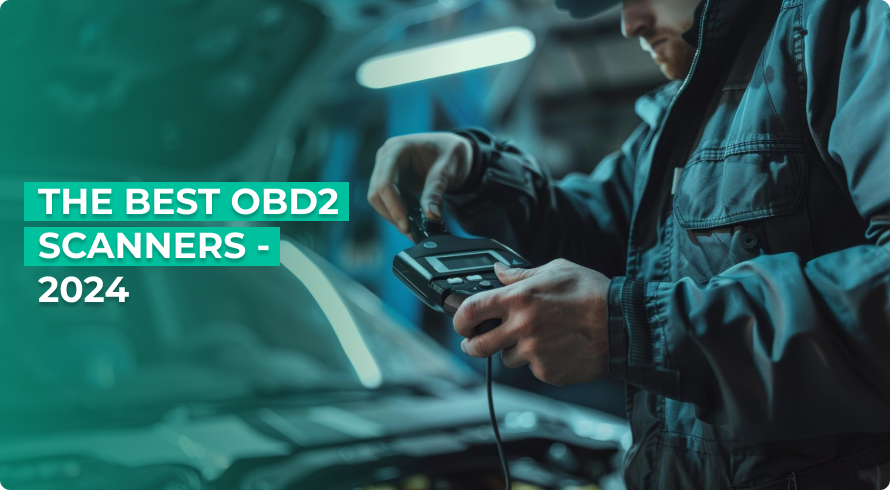

 Demo
Demo

